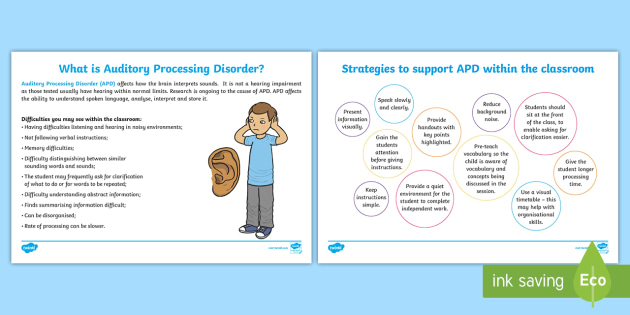
use electrodes to monitor your brain’s activities when using headphones to listen to sounds.gauge your ability to recognize patterns in sounds.determine if you can pick up on subtle changes in sounds, such as changes in intensity or pitch.assess your ability to hear and understand speech in a variety of scenarios, including with background noise, competing speech, and rapid speech.evaluate whether or not your condition is due to hearing loss or APD.Some examples of the types of tests that they may use include those that: Using the information the multidisciplinary team provides from the tests that they’ve performed, the audiologist will make a diagnosis. Teachers can offer feedback on any learning challenges.A speech-language therapist can evaluate your oral and written communication skills.A psychologist can assess cognitive functioning.An audiologist can perform a variety of hearing tests.This can help your healthcare provider rule out any other potential causes for your condition. Multidisciplinary approachīecause multiple conditions can be similar to or occur along with APD, a multidisciplinary approach is typically used to make a diagnosis. This can include evaluating your symptoms and when they started as well as checking to figure out if you have any risk factors for APD. The first part of the process involves taking a thorough history. There’s no standard process for diagnosing APD. How is auditory processing disorder diagnosed? However, because the problem involves processing sounds, testing often shows that their ability to hear is normal.īecause they have problems processing and understanding sounds, people with APD often have trouble with learning activities, especially those that are presented verbally.


trouble with learning or enjoying musicĭue to these symptoms, those with APD may appear to have difficulty hearing.problems following or comprehending rapid speech or complex directions.difficulty concentrating or paying attention.problems distinguishing between similar sounds.trouble telling where a sound is coming from.needing a longer response time during conversation.frequently asking people to repeat what they’ve said or responding with words like “huh” or “what”.difficulty understanding speech, particularly in noisy environments or when more than one person is speaking.What are the symptoms of auditory processing disorder?


 0 kommentar(er)
0 kommentar(er)
